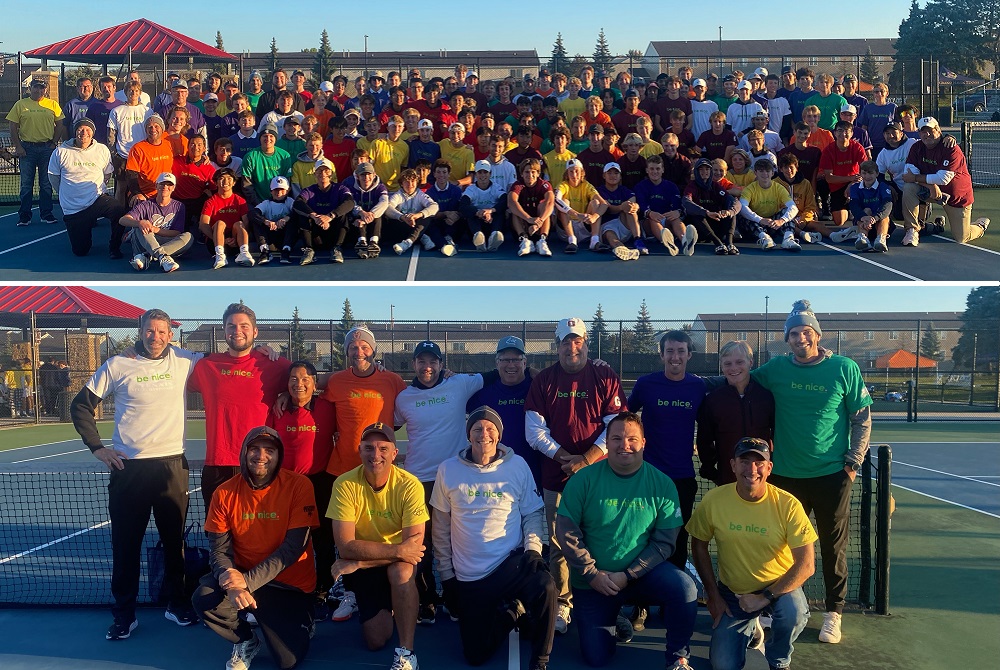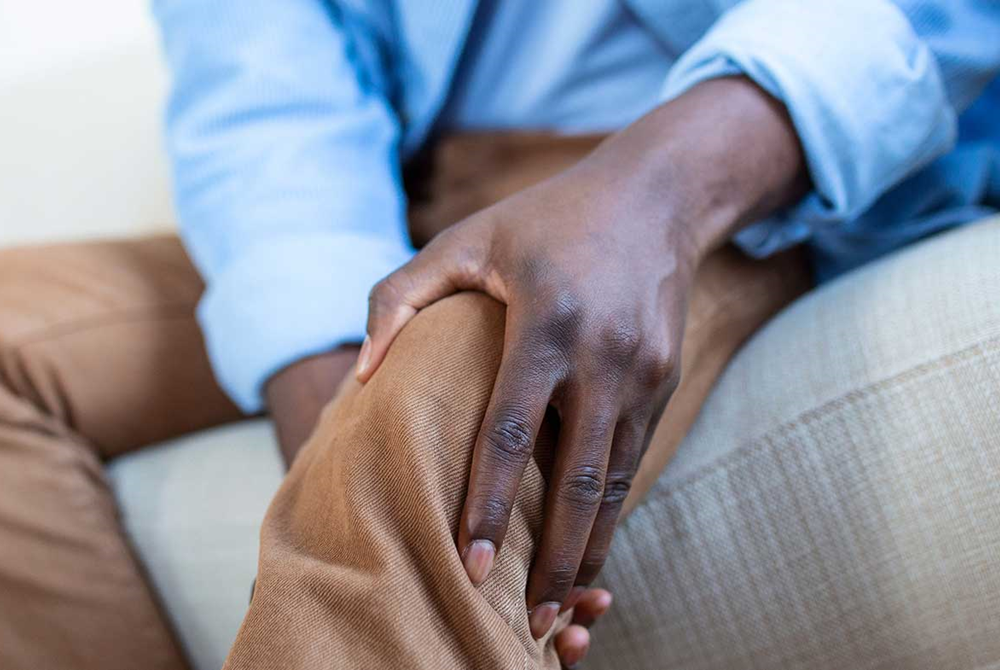
O-K Red Tennis Rivals Team Up to Promote Mental Health Awareness
By
Jon Ross
MHSAA Director of Broadcast Properties
October 7, 2022
The Ottawa-Kent Conference Red boys tennis championship was decided Saturday, but all eight teams also teamed up for something bigger.
All participants from league members Caledonia, East Kentwood, Grand Haven, Grandville, Hudsonville, Jenison, Rockford, and Holland West Ottawa warmed up together, wearing special “be nice.” shirts in their respective school colors.
The Mental Health Foundation of West Michigan provides the be nice. program, with its mission to promote mental health awareness and prevent suicide through education with a four-step action plan (Notice, Invite, Challenge, Empower). Additionally, be nice. provides mental health awareness training to all head coaches of MHSAA-sponsored sport teams.
“Over the past four years, coaches have received mental health and suicide prevention education by learning the be nice. action plan through annual rules meetings. Now these coaches are bringing it to their athletes and parents,” said Christy Buck, executive director of the Mental Health Foundation of West Michigan. “To see these coaches recognize the importance of having mental health discussions on their teams with their athletes gives me the chills. For the entire O-K Red, 140 coaches and athletes, to then take it a step further and bring awareness to their community is incredible. The information people received that day, without a doubt, started important conversations that will be life-changing for someone who was struggling, and that's what we're trying to do. The be nice. team program is simple, accessible, and it's going to save lives."
Leading up to the competition, every team had access to a be nice. team training that taught them to recognize the signs and symptoms of a mental illness and how to take action when they notice these changes. This program is a simple and effective way to empower coaches and athletes with a game plan for mental health concerns. Parents and spectators also were briefed on the be nice. action plan before the tournament began.
“Tennis is competitive and intense in the Red, but for the players and coaches, we see tennis as an extension of something bigger. It's about life, friendships, camaraderie, learning how to deal with adversity, learning how to lose, learning how to win, coming together as a family and creating collective goals,” said Rockford varsity tennis coach Tom Huizing. “Every day we try to live the be nice. way. Not only within our teams or within our conference, but within our lives outside of tennis.
“We've had many be nice. matches within the O-K Red, but now we wanted to set the standard as a conference and let everyone know that we are in this life together. We will notice, invite, challenge, and empower. All of us, not just one player or one coach or one team. Every player, every coach, every team. We want to walk the walk, not just talk the talk. So that's what we're doing on the biggest stage for our tennis conference. We are coming together at the O-K Red Conference finals and we are making a pact as an entire conference to be nice.”
Hudsonville and West Ottawa ended the season as co-champions of the O-K Red.
PHOTO The O-K Red brought together 140 athletes and coaches for its boys tennis championship tournament and also in an effort to bring awareness through the be nice. program. The entire group is pictured above, and the coaches below. (Photo courtesy of be nice.)

Symptoms of a Meniscus Tear — and When to Seek Treatment
April 2, 2024
Meniscus tears are not one size fits all: Sometimes they cause no pain, other times they’re excruciating.
 Once in a while they heal or adapt on their own, but more often than not they require physical therapy or surgery.
Once in a while they heal or adapt on their own, but more often than not they require physical therapy or surgery.
“Your meniscus is a fiber elastic cartilage that acts as a shock absorber for the knee,” says Ahmad Bazzi, M.D., a sports medicine physician at Henry Ford Health. “It also helps stabilize the knee joint. But when it tears — which can occur in young athletes after a pivot injury or in older people who have arthritis — it can be painful.”
Here, Dr. Bazzi shares symptoms of a meniscus tear and when to see a doctor.
What Does A Meniscus Tear Feel Like?
Depending upon the level of injury and type of tear, meniscus tears can either be asymptomatic or cause symptoms like:
- Locking. When the meniscus tears, a piece of it might move into the knee joint, causing mechanical issues like stiffness and locking of the knee joint.
- Catching or clicking. This often feels like a sudden ‘click’ in the knee joint, where it suddenly gives out while you’re walking or doing certain movements.
- Localized pain on the inner or outer part of the knee. In young athletes, a meniscus tear often causes an impaired range of motion and localized pain on the inner or outer part of the knee.
- Pain and swelling. In older people, a meniscus tear often causes swelling and an overall aching pain in the knee.
Treatment Options For Meniscus Tears
A meniscus tear can only heal on its own if the tear is on the outer part of the knee where it has better access to blood supply. If you’re experiencing pain a few days after injury and you have limited range of motion, instability and/or swelling in the knee, Dr. Bazzi recommends seeing a doctor to get an examination and, if needed, an MRI for diagnosis.
“It’s hard to tell what type of meniscus tear you have if you haven’t seen a doctor,” says Dr. Bazzi. “If you have a mechanically unstable tear and it goes untreated, it could lead to worsening range of motion and stiffness, or worsening arthritis. It’s important to get seen by a doctor to get an accurate diagnosis and the proper treatment. It may take one to three months for a full recovery.”
Here, Dr. Bazzi shares treatment options:
Surgery
If someone is having mechanical symptoms like locking or catching, surgery may be considered right away, especially if it’s an athlete younger than 40 years old. “Meniscus tear surgery has a shorter recovery compared to other knee surgeries,” says Dr. Bazzi. “Surgery could either consist of a meniscectomy, which is partial or complete removal of the meniscus, or sometimes just a meniscus repair.”
Hyaluronic acid or cortisone injections
Non-operative treatments are often recommended for older people who have degenerative tears due to arthritis. “This is because meniscus surgery doesn’t often relieve their pain since they have underlying arthritis, meaning they have cartilage loss in the meniscus,” says Dr. Bazzi.
Instead, a cortisone injection, which is an anti-inflammatory medication that can be injected into the knee, can reduce inflammation, swelling and pain caused by arthritis.
A hyaluronic acid injection may also be considered, which adds cushioning in the knee. “Hyaluronic acid is one of the substances that make up our cartilage, so this injection helps us mimic the lost cartilage,” says Dr. Bazzi. “It also has anti-inflammatory properties.”
Physical therapy
Physical therapy is another great option, especially for older people who need non-operative treatment options. It can help the knee adapt to the tear, reduce pain and encourage full range of motion. “Physical therapy for meniscus tears focuses on balance exercises and exercises to strengthen the muscles around the knee,” says Dr. Bazzi. “This helps to uphold the knee joint to achieve full range of motion and strength while being pain-free.”
To find a sports medicine provider at Henry Ford Health, visit henryford.com/athletes or call 313-651-1969.
Reviewed by Ahmad Bazzi, M.D., a sports medicine physician who sees patients at Henry Ford Medical Center – Fairlane.

